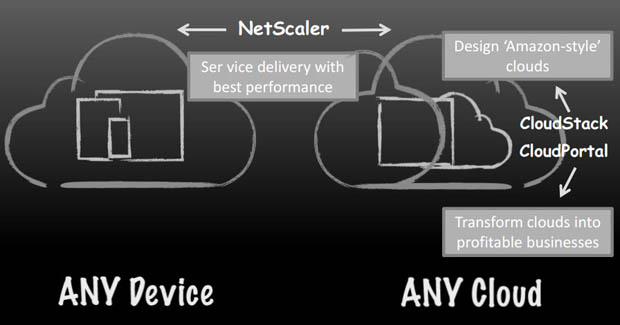Citrix, VMware lock horns over cloud

A Citrix executive last week took direct aim at VMware, which is dominating the virtualisation space, and said that there's a big risk of cloud-infrastructure lock-in.
Speaking at a Pacific Crest investment conference on Wednesday, Sameer Dholakia, group vice president and general manager of cloud platforms at Citrix, said that the company is looking to provide building blocks for "Amazon-style" clouds in the enterprise. He positioned Citrix as a more open provider than VMware.

(Credit: Citrix)
The two companies compete in virtualisation, as well as in application management. Citrix has acquired Cloud.com, and has a large portfolio of tools to build out services on demand. However, VMware's momentum continues unabated.
Dholakia put VMware on the opposite side of Citrix. He argued that Citrix's infrastructure is more in line with where the cloud is going and with how VMware focuses on server virtualisation. A few choice quotes from his talk:
This is the VMware state of mind: I've got the enterprise datacentre locked up with vSphere, and, as long as I can go get vCloud out in every service provider, I'll become the next monopoly, and extract rents from the industry for the next decade. Great for VMware; not so good for the rest of the industry, or for customers. And that's obviously why Citrix is so aggressive and so vested in preventing that outcome. We don't think that's good for anybody. And, frankly, there are enough organisations out there on the customer side of the world, and large vendors who also recognise the undesirableness, if that's a word, of that outcome.
(Credit: Citrix)
He also said:
We are talking to one enterprise organisation, large financial services business, that said, look, we're now spending more money with VMware than we are with Microsoft. And that's a pretty large statement, and we're only 50 per cent virtualised. I can't get to the 80 per cent target I want to if I continue down an exclusive path that is like the left side of the page. I need to look more like an Amazon-style cloud. So they started to go build one of those, and when you actually cost that out and it worked out to about 80 per cent cheaper. Just factors cheaper. And it was because at every layer of the cost equation, you're taking out massive costs. So you take out — so first at the infrastructure layer, the kind of hardware that you use in a cloud, on the right side of the page, is dramatically different than on the left. You'll never walk into a Google datacentre or an Amazon datacentre and find an expensive EMC SAN — promise; won't happen. That's just not what you use. And so the infrastructure costs are dramatically lower.
For the software costs, you're not paying premium rents to the likes of VMware for closed, proprietary software. And so, yes, Citrix is going to make money on that software layer, but it will be at a dramatically lower cost point, because it will be open-source based.
Dholakia's argument is interesting, because he framed the cloud debate as two silos. On one side, there's the VMware architecture, and then there's the open-source (Amazon-style) approach. The two sides will co-exist, but ultimately an open cloud approach wins. Dholakia almost positioned VMware as a future mainframe — a technology that is still around, but has seen its day.
Many enterprises see lock-in risk with VMware, but the big question is whether the company will suffer in the future. For instance, SAP and Oracle customers have complained about lock-in for decades, yet they still pay maintenance fees every year.
At the Goldman Sachs conference, VMware CFO Mark Peek was more diplomatic. Peek said that Citrix and VMware often occupy different spaces in the industry.
Peek was asked about comments from Citrix CFO David Henshall, who, speaking at the Goldman conference, noted that the company isn't invited to go toe to toe with VMware on the virtualisation front. When Citrix and VMware both battle for the same customer, Henshall is confident about his company's chances.
Peek said that he could say the same thing about Citrix, which is portrayed as being more about thin clients and desktop virtualisation. VMware is in desktop virtualisation, but Citrix has a large installed base.
"Citrix has a significant installed base, and I think there are a lot of deals where we probably don't know that we weren't invited to the party because — and it's also a different buyer," said Peek.
Via ZDNet US